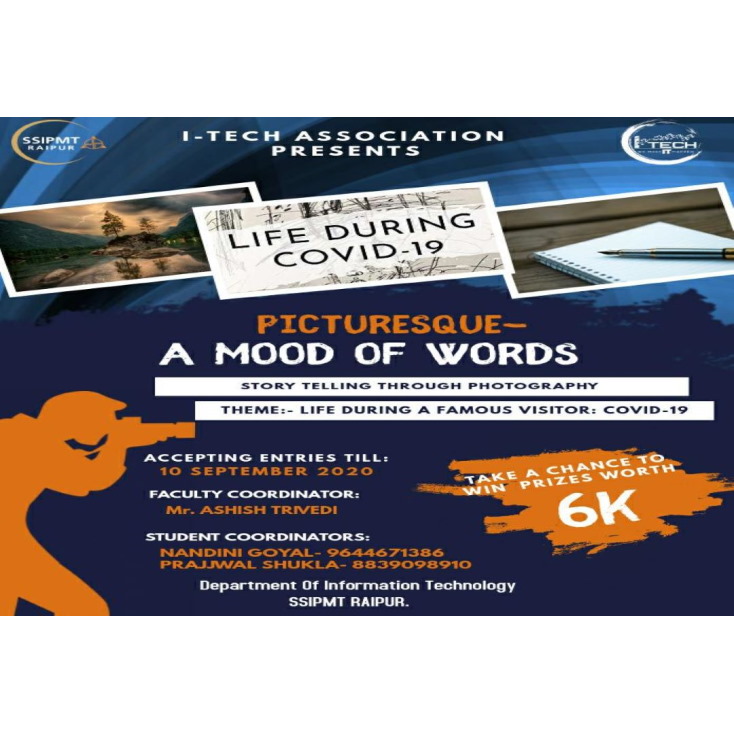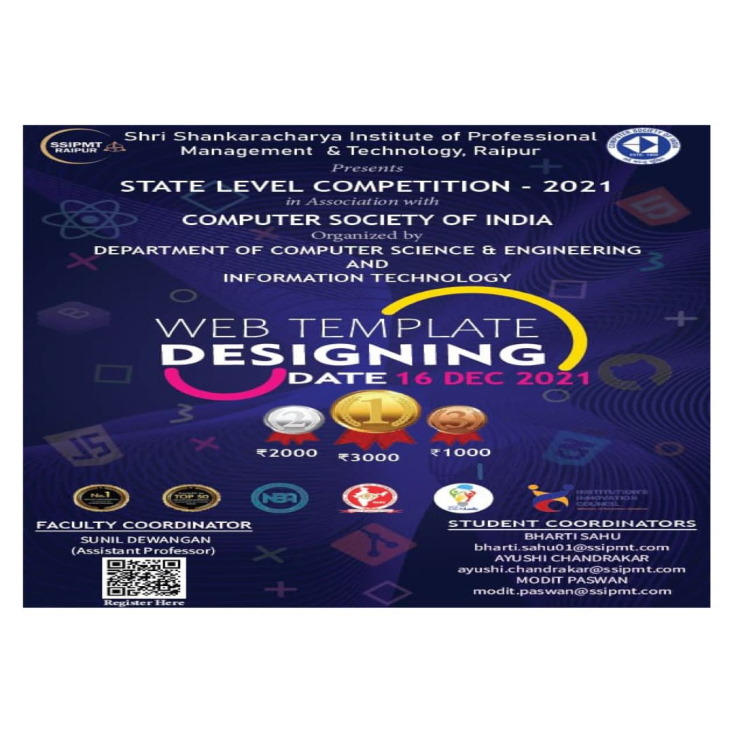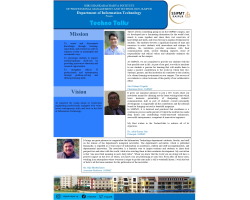Information Technology Department
Shri Shankaracharya Institute of Professional Management and Technology is a main specialized Institution in Chhattisgarh situated at Raipur. The undergrad Program in Information Technology is basically planned for building up an understudy with phenomenal programming and framework related abilities. The understudy should be creating abilities and information both in equipment and programming innovations identified with Information Technology. Educating is engaged in framework programming just as application programming. Abilities are created in PC engineering structuring, upkeep and systems administration.
The IT department currently offers a Bachelor of Technology (B.Tech) programme. The curriculum for IT covers all computer systems software and hardware, particularly computer systems, neuronal networks, software engineering, DBMS, computer structure, multimedia and communication systems, DSP & other emerging IT areas, according to the Chhattisgarh Vivekanand University syllabus and its unified team of the Bhilai Technical University. The Institute is developed by experts who have a good understanding of state-of-the-art technologies that are marketable and appropriate for basic concept and advance work including programming and analog circuits, artificial intelligence and cryptography.
Scope of Information Technology
This is a great field to have openings in programming organizations, web application, portable gaming, computer games, versatile applications, implanted framework, augmented reality, activity, remote system, endeavor processing, database framework, PC security and so on.
Jobs scenario for IT Engineers
India's liberalization can possibly be ascribed to its IT industry. In the year 1991, the industry made transition from $100 mn & 5000 employees at the starting phase to nearly $80 bn & 3000000 employees today and is expected to surpass US $100 bn in next few years. All major IT companies prefer IT students as much as students of CSE branch.
IT scenario in Chhattisgarh
Govt. of Chhattisgarh has taken the initiative to develop Naya Raipur as IT hub. Global leaders like Microsoft, Google, Intel etc. and Indian giants as TCS, WIPRO, Infosys have already signed MoU with government and infrastructure has already started taking shape. Requirement of IT engineers in Chhattisgarh itself is explosive and promises a very bright future.
IT Engineering at SSIPMT
- All faculties are GATE qualified & highly experienced.
- Blending trendy technologies with University Curriculum for producing industry ready students.
- Frequent workshops and seminars are conducted by the industry veterans and specialists.
- Placement record rubs shoulders with that of the Computer Science Engineering closely enough.
- SSIPMT has tie-ups with leading companies such as Wipro, Softgalaxy, Mphasis, Capgemini for a variety of activities related to training and placement.
- Faculty Development Programs & workshops are conducted time to time to make sure that standard of teaching is held high enough.
Department Vision
To empower the young minds as world-class engineering professionals equipped with value-based contemporary skills and tools in the field of Information Technology.
Department Mission
- To create and disseminate knowledge through learning, innovation, and research in order to enhance society in meaningful and sustainable ways.
- To encourage students to acquire multidisciplinary skills-sets by providing innovative education and research opportunities.
- To strengthen ethical IT professionals and entrepreneurs through problem-solving and lifelong learning skills.
Program Outcomes
| PO1 | Engineering Knowledge | Apply the knowledge of mathematics, science, engineering fundamentals, and an engineering specialization to the solution of complex engineering problems. |
| PO2 | Problem Analysis | Identify, formulate, research literature, and analyze complex engineering problems reaching substantiated conclusions using first principles of mathematics, natural sciences, and engineering sciences. |
| PO3 | Design & Development of Solutions | Design solutions for complex engineering problems and design system components or processes that meet the specified needs with appropriate consideration for the public health and safety, and the cultural, societal, and environmental considerations. |
| PO4 | Investigations of Complex Problems | Use research-based knowledge and research methods including design of experiments, analysis,and interpretation of data, and synthesis of the information to provide valid conclusions. |
| PO5 | Modern Tool Usage | Create, select, and apply appropriate techniques, resources, and modern engineering and IT tools including prediction and modeling to complex engineering activities with an understanding of the limitations. |
| PO6 | Engineer and Society | Apply reasoning informed by the contextual knowledge to assess societal, health, safety, legal and cultural issues and the consequent responsibilities relevant to the professional engineering practice. |
| PO7 | Environment and Sustainability | Understand the impact of the professional engineering solutions in societal and environmental contexts, and demonstrate the knowledge of, and need for sustainable development. |
| PO8 | Ethics | Apply ethical principles and commit to professional ethics and responsibilities and norms of the engineering practice. |
| PO9 | Individual and Team Work | Function effectively as an individual, and as a member or leader in diverse teams, and in multidisciplinary settings. |
| PO10 | Communication | Communicate effectively on complex engineering activities with the engineering community and with society at large, such as, being able to comprehend and write effective reports and design documentation, make effective presentations, and give and receive clear instructions. |
| PO11 | Project Management and Finance | Demonstrate knowledge and understanding of the engineering and management principles and apply these to one’s own work, as a member and leader in a team, to manage projects and in multidisciplinary environments. |
| PO12 | Life-long Learning | Recognize the need for, and have the preparation and ability to engage in independent and life-long learning in the broadest context of technological change. |
Program Specific Outcomes (PSO's)
| PSO1 | Specify, design, develop, test and manage reliable and efficient application software systems that uses SDLC(Software Development Life Cycle) principles as per user requirements on the required platforms including Desktop, Mobile, Distributed and Network environments. |
| PSO2 | Understand the architecture and design of Digital Computers including multi-core processors. |
| PSO3 | Understand the design and use of System Softwares and packages including Compilers, Operating Systems, Database Management Systems and Soft Computing tools. |
Program Educational Objectives (PEO's)
| PEO1 | Graduates will develop the knowledge of basic science in general and information technology in particular, with essential skills to analyze, formulate and solve engineering problems. |
| PEO2 | Graduates will have a professional attitude for lifelong learning so that they will be able to create innovative products and solutions for real-life problems. |
| PEO3 | Graduates will emerge as professionals with strong ethical values and will be able to work in a multidisciplinary environment. |
| PEO4 | Graduates will be able to take up challenges and lead IT organizations with their innovative software and hardware skills. |
| PEO5 | Graduates will develop reliability and appropriate leadership skills contributing not just to their professional growth but the societal growth at large. |
Laboratories
| S No. | Semester | Laboratory | Capacity |
|---|---|---|---|
| 1 | 3rd Semester | Software Lab (Programming in Java) | 60 |
| Computer Networks Lab | |||
| COA & Microprocessor Lab | |||
| Digital Electronics Lab | |||
| 2 | 4th Semester | Data Structures Lab | 60 |
| Database Management System Lab | |||
| Operating System (UNIX) Lab | |||
| Virtual Lab (IoT Lab) | |||
| 3 | 5th Semester | Artificial Intelligence & Machine Learning Lab | 60 |
| Software Engineering & Project Management Lab | |||
| Principles of Communication System Lab | |||
| Project-I based on Summer Internship/Industrial Training | |||
| 4 | 6th Semester | Computer Graphics & Data Visualization Lab | 60 |
| Mobile Application Development (Android) Lab | |||
| Web Application Development Lab | |||
| Project –I (Android) | |||
| 5 | 7th Semester | Cryptography and Network Security Lab | 60 |
| Cloud Computing Lab | |||
| Project (Phase I) | |||
| 6 | 8th Semester | Hadoop (Lab) | 60 |
| Simulation (Lab) | |||
| Project (Phase-II) |
Departmental Association
I-Tech
The department of Information Technology (IT) is having an association name i-tech. This departmental association was shaped in August, 2011. The 2nd, 3rd and 4th years students are involved in the association. On behalf of the association we are conducting the seminars, paper presentations, workshops and association activities. We are conducting the seminars and workshops on emerging technologies like Microsoft Windows Phone-8, Ethical hacking, android, .net, python etc.,
The Objective of this association is to provide some extra technical, logical and industry oriented knowledge apart from regular curriculum. Some points are given below on which we have we are focusing most:
- Team work
- Leadership quality
- Communication Skill
- Technical expo.
- Extra Curricular Activity
Some of the marked Events are listed below:
Year- 2011: online gaming, quiz, extempore, model making (inter branch).
Year- 2012, 2013, 2014: Republic Day Celebration arranged by Dept. of IT.
Year- 2015-16: Online Gaming (NFS, Counter Strike), Template Design, Extempore





